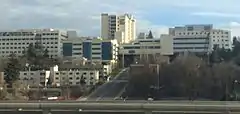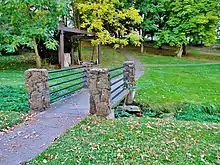| Providence Sacred Heart Medical Center & Children's Hospital | |
|---|---|
| Providence Health Care | |
 Sacred Heart Medical Center in 2017 | |
| Geography | |
| Location | 101 West Eighth Avenue, Spokane, Washington, United States |
| Coordinates | 47°38′56″N 117°24′47″W / 47.649°N 117.413°W |
| Organization | |
| Care system | Public, Medicaid, Medicare[1] |
| Funding | Non-profit hospital |
| Type | General |
| Religious affiliation | Catholic |
| Affiliated university | Washington State University[2] |
| Services | |
| Standards | Joint Commission |
| Emergency department | II[1] |
| Beds | 648[1] |
| Helipad | Yes |
| History | |
| Opened | 1886 |
| Links | |
| Website | www |
| Lists | Hospitals in Washington |
Providence Sacred Heart Medical Center & Children's Hospital (more commonly known as Sacred Heart Medical Center or simply Sacred Heart) is a 648-bed general hospital in Spokane, Washington. It employs more than 4,000 health care professionals and support staff; its medical staff consists of over 800 specialists and primary care doctors.
Services Include: main medical center/ER, children's hospital, women's health center, specialized centers for robotic and minimally invasive surgery, cardiology, orthopedic surgery, stroke center, neuroscience and cancer. Sacred Heart is rated as a "high performing" hospital in ten adult procedures and conditions according to U.S. News & World Report.[3]
History
_(14769136662).jpg.webp)
Heeding the call of Fr. Joseph Cataldo, a Jesuit father, Mother Joseph of the Sacred Heart and Sister Joseph of Arimathea, two Sisters of Providence, traveled from Vancouver, Washington, at the end of April 1886 to survey sites where they could establish a hospital in Spokane. On May 14, 1886, the Corporation of the Sisters of Providence agreed to build and within days ground was broken and construction under way at a site on the south bank of the Spokane River at Front Street between Browne and Bernard in what was then known as Spokane Falls. When the cornerstone was being blessed on July 2, 1886 (the feast of the Sacred Heart), the bishop of Nisqually, Aegidius Junger, asked for the name of the hospital. As no name had been received from the General Administration in Montreal at that point, the sisters had no name to give. The hospital received its name when a priest piped in: "It will be Sacred Heart Hospital."[4]
The hospital formally opened on January 27, 1887, but the sisters received their first patient, a blacksmith by the name of John Cox, on January 15. Three days after his admittance, Mr. Cox also became the hospital's first death.[5] As Spokane's population grew, so too did the number of sick, injured, and poor: the sisters’ works were quickly outgrowing the original building so a new wing was added in 1889.
Sacred Heart was the region's first hospital, a 31-bed, wood-framed structure built along the Spokane River where the Spokane Convention Center now stands. It quickly outgrew its first location and in 1910, it was moved (as well as expanded) to its current location on Spokane's South Hill.
The present Sacred Heart Medical Center's nine-story patient tower was built in 1971.[6] By 1984 the new East addition housed psychiatric, outpatient, radiology, and pediatric surgery services. More recent campus developments include the Spokane Heart Institute (1991), the expansion of the Sacred Heart Doctor's Building (1993), and Emilie Court, an assisted living facility (2000). Responding to requests from the medical community, and supported by the community leaders and families, Sacred Heart Children's Hospital, the region's first full-service Children's Hospital opened in 2003. The fall of 2004 saw the opening of the Women's Health Center and Surgery Center, West Tower addition. A special pathogens unit was constructed in 2015 in the east addition with federal funding to host people with highly infectious diseases.[7]
With the outbreak of the COVID-19 pandemic in early 2020, Providence Sacred Heart Medical Center was one of the first hospitals to receive COVID-19 patients due to its Special Pathogens Unit.[8] The unit was established in 2015 as one of 10 regional treatment facilities for the National Emerging Special Pathogens Training and Education Center (NETEC).
Campus

Located in Spokane's Cliff/Cannon neighborhood in what is referred to locally as the "Medical District," Sacred Hearts growing campus and its immediate surroundings include ancillary services such as assisted living residences, a hotel, a Center for Faith and Healing garden, as well as a park called Cowley Park.[9][10] Cowley Park is on the National Register of Historic Places and is the former site of the Reverend Henry T. Cowley home when he arrived in 1874 and the areas first public school.[11] Three trees he planted, a maple, ash, and a sycamore still stand.
Mary's Place
Although not a part of the campus, a private family residence is almost entirely encircled by the hospital complex, just south of the neighboring Women's Health Center. This four-story home is called "Mary's Place," after Mary Gianetsas, who lived in the house until her death in the hospital next door in 1991; Mary, an immigrant from Greece, purchased the home in 1944 for $20,000 ($332,476 in 2022 dollars) and resisted the pressure to sell the property for 50 years from the expanding hospital.[12] She had rebuffed an initial offer of $200,000 in 1960 ($1.98 million in 2022 dollars) when Sacred Heart had planned a major expansion with a new patient tower, the resistance to sell has resulted in campus redesigns-causing unusual architectural decisions and challenges to design around.[12] Mary's son, George told the press that "she loved that house...she just did not want to sell it...that's where she wanted to die."
Services
The hospital is equipped with the staff and resources to operate a level II adult and pediatric trauma center, the only such center in the Inland Northwest.[13] Sacred Heart also has a Level IV regional Neonatal Intensive Care Unit.[14][15] The Providence Spokane Heart Institute retains specialized physicians with expertise that encompass all aspects of cardiovascular care and work to enhance and pioneer new diagnostic testing, medications, interventions and surgical techniques and hence are referred difficult cases from elsewhere in the region.[13]
Sacred Heart is the designated special pathogens unit for the Pacific Northwest and is one of ten such units in the country with federal certifications to treat highly infectious diseases.[16] The facilities were used to treat people during the Western African Ebola virus epidemic and four passengers from the stranded-in-port Diamond Princess cruise ship in 2020 during the early stages of the COVID-19 pandemic.[17]
Sacred Heart performs heart, lung, kidney and pancreas organ transplants.[18]
Affiliations
Other affiliated institutions are located nearby the hospital campus such as the Providence St. Luke's Rehabilitation Medical Center, as well Inland Northwest Behavioral Health, a Universal Health Services facility that is a joint venture between Providence Health Services and Fairfax Behavioral Health of Kirkland, Washington.[19][20]
Sacred Heart has a long relationship with the Washington State University College of Pharmacy on the WSU Spokane campus and since the inception of the Elson S. Floyd College of Medicine, the hospital has hosted a residency program that offers a teaching certificate.[21] As of June 2020, the hospital had 72 interns and residents.[1]
See also
References
- 1 2 3 4 "Identification and Characteristics". American Hospital Directory. Retrieved September 19, 2020.
- ↑ "Frequently Asked Questions". Providence. Retrieved September 19, 2020.
- ↑ "Overview of Providence Sacred Heart Medical Center and Children's Hospital". U.S. News & World Report. Retrieved September 27, 2020.
- ↑ Dominick, Emily. "Providence Sacred Heart Medical Center and Children's Hospital (Spokane, Washington) Records: Collection Finding Aid" (PDF). Providence Archives, Seattle. Retrieved 13 January 2014.
- ↑ Sacred Heart Hospital Patient Ledger, 1887-1900 (PDF). Providence Archives, Seattle.
- ↑ Shelton, Jim (February 2, 1972). "Razing of old Sacred Heart picks up steam". Spokesman-Review. (Spokane, Washington). (photo). p. 1.
- ↑ KREM Staff (March 13, 2020). "All Cruise patients released from Spokane's Sacred Heart". MSN. Retrieved 2020-08-04.
- ↑ Raabe, Vanessa N; Lighter, Jennifer; Caplan, Arthur L; Ratner, Adam J (2020-05-27). "Importance of Pediatric Inclusion in COVID-19 Therapeutic Trials". Clinical Infectious Diseases. 71 (12): 3248–3249. doi:10.1093/cid/ciaa656. ISSN 1058-4838. PMC 7314177.
- ↑ "Campus, Floor & Parking Maps". Providence. Retrieved November 11, 2021.
- ↑ "Chaplains and Spiritual Care". Providence. Retrieved November 11, 2021.
- ↑ Rebstock, Tracy L. "Cowley Park". Spokane Historical. Retrieved November 11, 2021.
- 1 2 "Mary Gianetsas, 88, Who Owned `The House Money Couldn't Buy'". The Seattle Times. March 7, 1991. Retrieved November 11, 2021.
- 1 2 "Level II Trauma Center | Spokane, WA | Providence Washington". Retrieved 2020-08-04.
- ↑ "Providence Sacred Heart". Neonatology Solutions, LLC. Retrieved June 30, 2021.
- ↑ Thayer, Lucas (March 27, 2014). "Sacred Heart Children's Hospital attains top designation". Spokane Journal of Business. Retrieved June 13, 2021.
- ↑ "A look inside the Sacred Heart unit prepared to take on coronavirus patients". KHQ Right Now. Retrieved 2020-08-04.
- ↑ Dreher, Ariele. "'No risk' of contracting coronavirus from 4 patients in Spokane hospital, says official". The Spokesman Review. Retrieved 2020-08-04.
- ↑ "Transplant Programs". Washington State Department of Health.
- ↑ Tinsley, Jesse (February 5, 2018). "Then and Now: St. Luke's Hospital". The Spokesman-Review. Retrieved November 11, 2021.
- ↑ Thomas, Virginia (September 13, 2018). "100-bed Inland Northwest Behavioral Hospital prepares to open". Spokane Journal of Business. Retrieved November 12, 2021.
- ↑ "WSU starts developing medical residency program > Spokane Journal of Business". Journal of Business. Retrieved 2020-08-04.
External links
- Official website
- Crompton, Kim (2006-12-07). "Finding STRENGTH in numbers". Journal of Business. Archived from the original on 2007-01-01. Retrieved 2006-12-09.
- "Sacred Heart Medical Center - History". Retrieved 2006-12-09.
